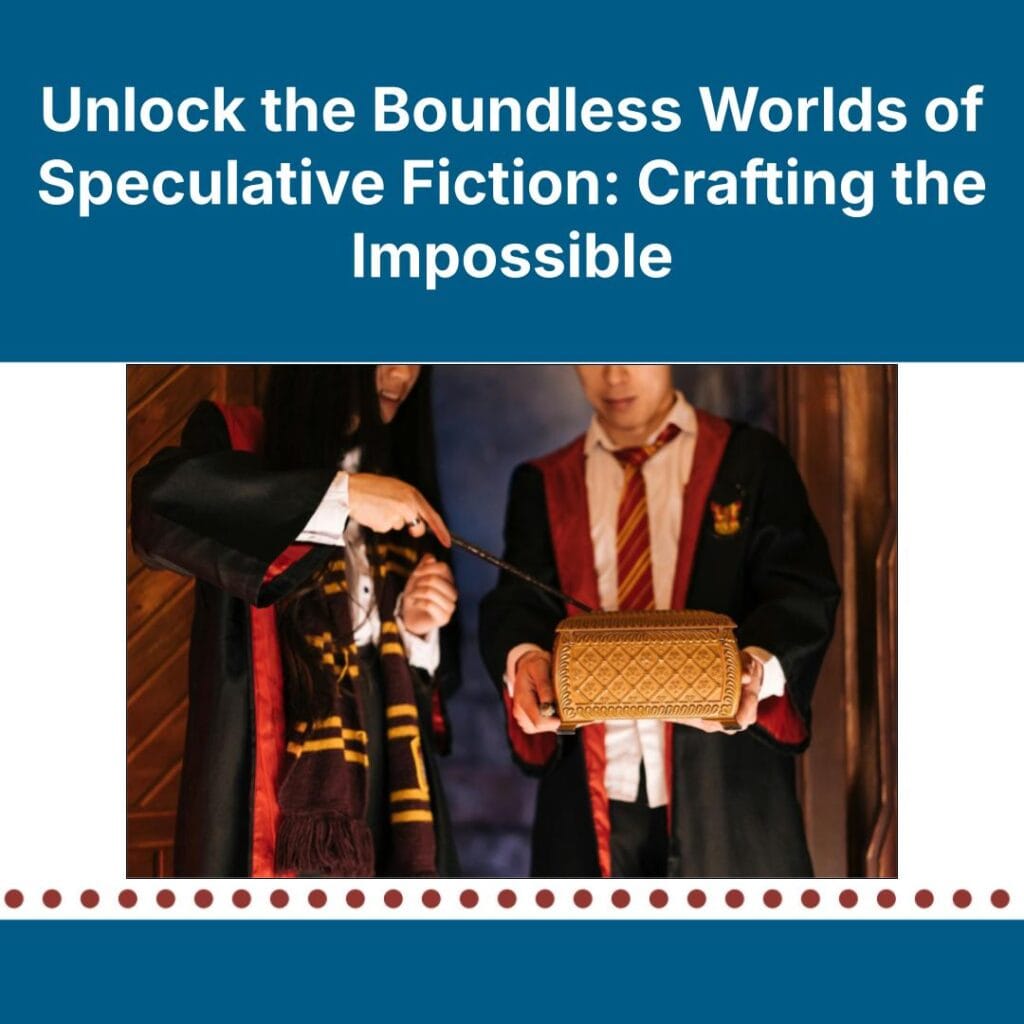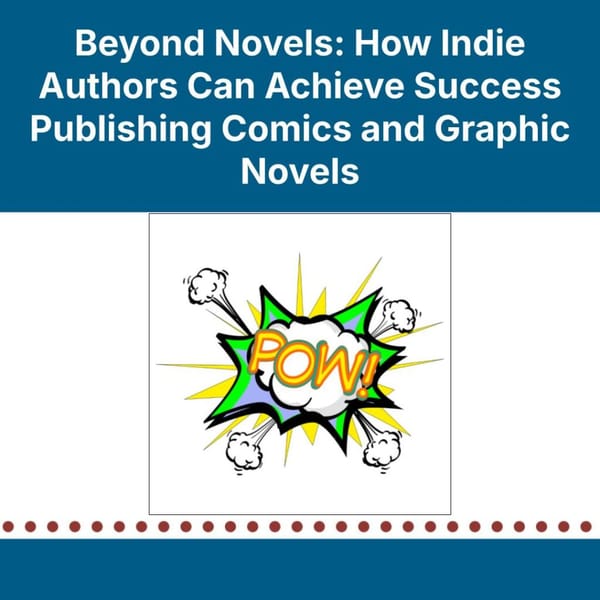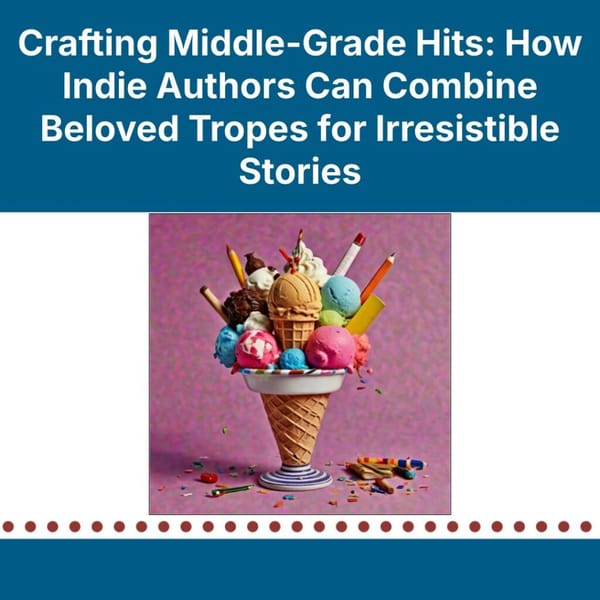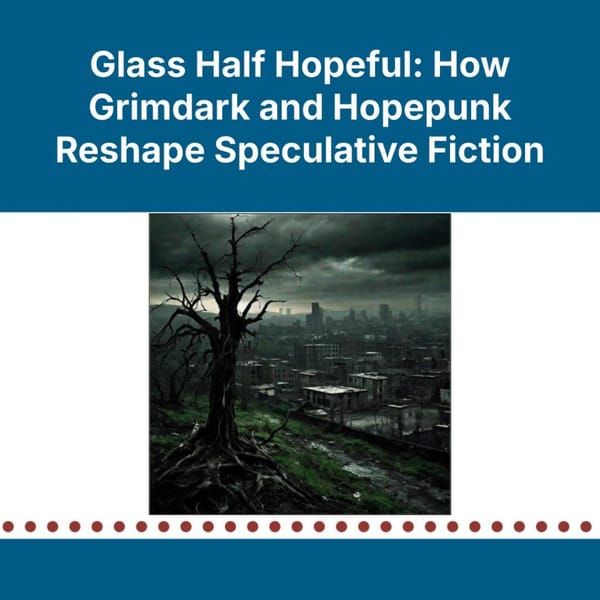Care to Speculate?
Speculative Fiction Allows Authors to Flex Ultimate Story Control
Spider monkeys rule the galaxy. Children govern societies. The Roman Empire never fell. Wait … these things aren’t possible, right?
With Speculative Fiction, anything is possible.
Speculative Fiction is a broad and diverse genre that allows writers to explore endless creative possibilities. Encompassing genres like Science Fiction, Fantasy, Magical Realism, and Dystopian fiction, stories in this larger category invite authors to stretch beyond the boundaries of reality. “I think of ‘Speculative Fiction’ as the ‘what if?’ section,” says author Ellen Smith. “It covers all the elements that aren’t possible—or aren’t possible yet.”
Imagine Speculative Fiction as perpendicular rather than parallel to our world, with realities distinctly different from what we know. A story might begin with a familiar setting, but the world is governed by the writer’s rules. Author S. R. Webster notes that “these stories often tackle societal or moral dilemmas using creative and fantastical settings.” The genre's flexibility is demonstrated by an array of authors, from Mary Shelley and George Orwell to Ursula K. Le Guin, Margaret Atwood, George R. R. Martin, and Neil Gaiman—each shaping Speculative Fiction in unique ways.
Mapping out a World
When embarking on a Speculative Fiction project, keep in mind that you, as the author, are in control of every detail. You may start with reality, but world-building offers the freedom to design every element of your story’s universe. Although this may seem daunting at first, it’s an invitation to unleash your creativity. Webster explains, for her, “It all begins with a flicker of an idea, which soon catches fire and ignites into a full-blown brainstorming session. From there, I dive deep into exploring the concept, homing in on the central theme, and defining the setting in which it will take place.”
Smith’s approach to world-building is similar. “When I have a new story idea, I’m always jotting down questions as I think of them,” she says. “It usually starts with a concept that captures my imagination, like time travel, and then I can’t get it out of my head. As I’m thinking about it, I’ll ask myself questions like, ‘If this was possible, who would think it was a great idea? Who would absolutely hate it?’ or ‘What’s the best possible way this could be used? What’s the worst thing that could go wrong?’ Over time, characters and their conflicts start to take shape, and I start writing more and more detailed notes.”
Developing a story world will take research, but caution: Don’t disappear entirely into the rabbit hole, as it can stall your story indefinitely. As questions arise, jot them down and proceed to research with the focus solely on those questions, so you can keep your writing moving forward. You can always layer in details on your second pass of the manuscript.
Taming a Series
While Speculative Fiction doesn’t have to span a series, once you’ve built a rich, complex world, it can be tempting to explore it further. Whether you create a series may depend on reader feedback. Are reviewers clamoring for more, asking what happens next? With that ambition comes the need for consistency across multiple books. Readers will quickly spot any inconsistencies in your characters, world rules, or timeline.
Webster emphasizes the importance of having a detailed reference document to keep track of key aspects of your story world, such as geography, history, culture, the specifics of your magic system, or technology, as well as character backstories. “You need to ensure that all the elements make sense and are consistent throughout the series,” she says. Whether your world involves futuristic technology or medieval fantasy kingdoms, this organization will help avoid potential plot holes.
Smith, whose current series involves time travel, finds that using a detailed calendar system is crucial. “I created them [calendars] for each book so I can track what events the characters are aware of in each timeline.”
For the Pantsers
For writers who prefer to fly by the seat of their pants without extensive planning, how do they maintain consistency in a world they’re still discovering?
Webster says she has devised a system over time that works for her. “I begin with character voice and flow, and let the world-building come later,” she says. This approach allows pantsers to develop the narrative organically while still maintaining some structure when needed. After you’ve completed a first draft, let the story sit just long enough for you to return to it with fresh eyes. Then, start on page 1 and read it through, noting where the story needs more development, and where details may be trimmed back or changed for consistency.
Speculative Fiction Awaits
If you haven’t yet ventured into Speculative Fiction, a whole new world of creativity awaits you—one where the only rule is that everyone plays by the rules you create, with limitless possibilities for world-building, character development, and storytelling.
Speculative Fiction Tropes
- Time Travel: Characters travel backward or forward in time, creating paradoxes or alternate timelines.
- Dystopian World: A future or alternate society is oppressed, controlled, or in decline, often under a totalitarian regime. Characters often reach a breaking point and push back to improve their lives or chance for survival.
- Post-Apocalyptic World: The story is set in a world after a catastrophic event, where survivors navigate dangerous landscapes and societal breakdown.
- Parallel Universe(s): Multiple alternate realities exist, where different versions of characters or events unfold.
- Alien Invasion: Extraterrestrial beings invade Earth, typically threatening humanity with extinction or subjugation.
- Artificial Intelligence: AI systems either assist or challenge humanity, sometimes rebelling against their creators.
- Magical Realism: Magical or fantastical elements meld with an otherwise realistic or ordinary world.
- Alternate History: The story is set in a version of history where major events happened differently, resulting in a changed world for readers to explore and compare with their own.
Desiree Smith-Daughety











